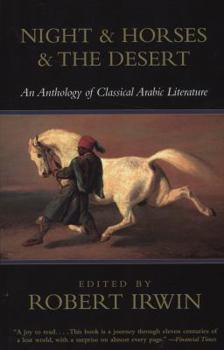Night & Horses & the Desert: An Anthology of Classical Arabic Literature
Select Format
Select Condition 
Book Overview
Spanning the fifth to the sixteenthcenturies, from Afghanistan to Spain, Night and Horses and the Desert includes translated extracts from all the major classics in an invaluable introduction to the... This description may be from another edition of this product.
Format:Paperback
Language:English
ISBN:0385721552
ISBN13:9780385721554
Release Date:January 2002
Publisher:Anchor
Length:480 Pages
Weight:0.89 lbs.
Dimensions:8.0" x 1.0" x 5.2"
Customer Reviews
2 ratings
To The Max
Published by Thriftbooks.com User , 16 years ago
We more books like this, for every literature and every language on the planet. My only complaint is that most of the translations are not his own, but are taken from various sources such as articles or even histories where the translations may or may not have been a centerpiece. That means that you're getting fragments of authors that may not be meritorious in their own right, but were meant to further the author's point in the original source. So basically he's pilfered a library-worth of already translated bits and pieces given them all back to you with historical context included, and what this means is that the most famous works and certain highly famous authors (such as Al-Mutenabby or Al-Farazdaq) aren't represented by more than a few lines of their own, while other authors, not as well known, are given pages and pages.
A Serious Effort, Worth the Read
Published by Thriftbooks.com User , 23 years ago
In what may be his most ambitious non-fiction work to date, Mr. Irwin has tackled a truly daunting task - an anthology of Arabic literature. I give him four stars. The fourth star is for attempting the effort in the first place.Theoretically, there is no reason why it should be any more difficult to prepare an anthology of Arabic literature than it would be for, say, Chinese literature; rather the contrary. However, I suspect that preparing an Arabic anthology is much harder. First of all, the traditional themes of Arabic literature - religion, romantic lament, fate, panegyric - on the whole have little appeal for Westerners, especially compared to a literature like the Chinese, which seems so secular and "modern" in theme by comparison. Secondly, most truly great Arabic literature is poetry, which is notoriously difficult to translate, and what's worse, the canons of poetic taste that govern it are almost entirely untranslatable into anything comparable in English.Despite these handicaps, Irwin has done an admirable job. One notices that there is a great deal of commentary. The selections tend to be short, with a great deal of explanation in between. There is so much commentary, in fact, that the book sometimes seems more a literary history than an anthology. However, this approach is necessary if the reader is to develop any appreciation at all of the material. Quite frankly, Arabic literature is a closed book to most readers, even in translation, and without a large amount of explanatory material the average reader would be lost.Irwin also resists the impulse, very common in specialists in a given literary area, of putting in a large number of his own translations. He does an excellent job of selecting the translations, in fact - a difficult task in itself, because there is an incredibly large number of bad translations from Arabic; for many translators, the attempt to be faithful to the Arabic models simply results in English doggerel. You will find no examples of this type in the book.If there is little to be said about the period after roughly 1300, there is a good reason for this: most of the truly great literature produced in the Middle East after that time was written in Farsi, and to a lesser degree in Turkish, both of which are not part of the subject matter for this book. In doing so, Mr. Irwin perhaps handicaps himself, but his intent is obviously to focus on Arabic literature. Outside of specialists, very little Arabic literature is known, whereas a great deal of Persian literature is readily available.Certainly, it will be a long time before the names of Abu Nuwas or Mutanabbi are houshold words. Before that can happen, however, there must be an appreciation of the literary environment that formed Clasical Arabic literature. Mr. Irwin's book is admirable in its attempt to convey that environment. To the reader sincerely interested in deepening his knowledge of Arabic civilization, it will be rewarding. To the reader






